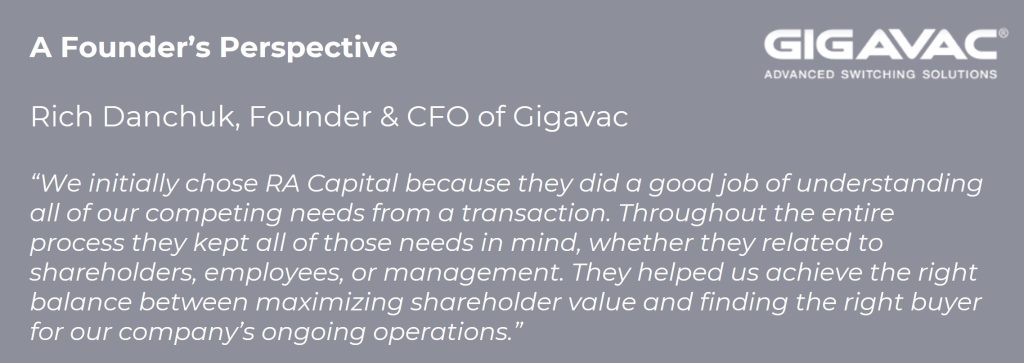The Compelling ROI of Hiring an Investment Bank
It is funny that the market calls our firm, RA Capital Advisors LLC (“RA Capital”), an “investment bank” considering (i) we don’t make investments and (ii) we are not a depository bank. More than 75% of our business is advising privately-held companies who are considering a sale or other liquidity event. At our core, we try to do two simple things: (i) let a seller have multiple options so they can pick the best ‘home’ for the business, continuing employees, and founder legacy, and (ii) don’t leave chips on the table by soliciting each suitor’s highest and best price and terms.
When you, as a founder, entrepreneur, and/or owner of a closely-held business, are considering selling your business, the question of whether to engage an investment bank often arises. Undoubtedly, hiring an expert in mergers and acquisitions (“M&A”) comes with some expense, but understanding the financial payoff of hiring an investment bank is crucial in making an informed decision.
Expertise in Getting the “Highest and Best” Offer
One of the key benefits of hiring an investment bank is its expertise in running a competitive process that allows you – the business owner – to see what each buyer’s highest and best price actually is. A well-established investment bank brings a deep understanding of market trends and competitive advantages that positions your business to receive the best offer. Many one-on-one negotiations result in money being left on the table, as true price discovery of what something is worth only comes when a buyer knows there is another bidder right there behind them. The fear of missing out – a buyer guessing or fearing what someone else might pay – is what truly drives a highest and best offer.
Consider a study from the University of Alabama and Portland State University involving more than 4,000 transactions over a 20-year period. The survey found that sellers who hired an investment bank received valuation premiums around 25%. Perhaps more insightful, the survey found that 99% of the study’s business sales by sophisticated institutional sellers (meaning sales by private equity firms and strategic buyers, rather than to them) involved an investment bank1.
Access to a Broad Network of Potential Buyers Lets a Seller Pick the “Right Home” for their Business
Investment banks have extensive networks of potential buyers, including those you may not be able to reach independently. These networks span industries and geographies, increasing the likelihood of finding the right buyer that recognizes the true value of your business. This broader reach often translates into higher offers and better sale terms, but also allows a business owner to meet and evaluate the chemistry with the buyer and the culture they may instill after the transaction has been consummated.

Skillful Negotiation in Structuring the Transaction
Negotiating a business sale is complex and involves numerous variables. Investment banks are adept at structuring deals to maximize seller proceeds while considering tax implications and other key terms. For example, do you understand the structure of equity that you are being offered in a transaction and how it compares to the buyer’s equity? Not understanding key differences between the two can have a significant impact on the value of that equity down the road. An investment bank’s negotiation skills can make a significant difference in the final structure of a transaction, ensuring that you receive the best representation in the deal.
Allowing You to Focus on Running Your Business
Selling a business without an investment bank can be time-consuming and a distraction from day-to-day operations. An investment bank manages the sales process at each stage, from preparing marketing materials to conducting due diligence through the close. A transaction process can involve contacting and managing 100+ buyers through the process. The biggest risk during the sale process is that the business underperforms because your team is distracted by the transaction. An investment bank augments your team by allowing you to focus on maintaining or even increasing the value of your business during the sales process.
Risk Mitigation and Deal Closure
Investment banks are proficient in identifying and mitigating risks that could derail a deal. Their experience in managing the intricacies of a transaction reduces the likelihood of last-minute surprises or deal collapse. They also allow for a smoother due diligence process, a critical stage where many deals falter.
Conclusion: Don’t ‘Go It Alone’ – Hire an Expert
The decision to hire an investment bank should be seen as an investment in the future of your business and its legacy. The expertise, networks, negotiation skills, and deal management an investment bank provides can be invaluable, especially for first-time sellers. For business owners, founders, and entrepreneurs considering a sale, engaging an investment bank, like RA Capital, can be a strategic move that maximizes the return on one of the most significant transactions of their lives.
Would you like to speak with someone at RA Capital regarding an eventual sale transaction? Get in touch: info@raca.com
Note: Testimonials may not be representative of the experience of other clients and offer no guarantee of future performance or success.
Source(1): Harvard Law School Article – Does Hiring M&A Advisors Matter for Private Sellers?

